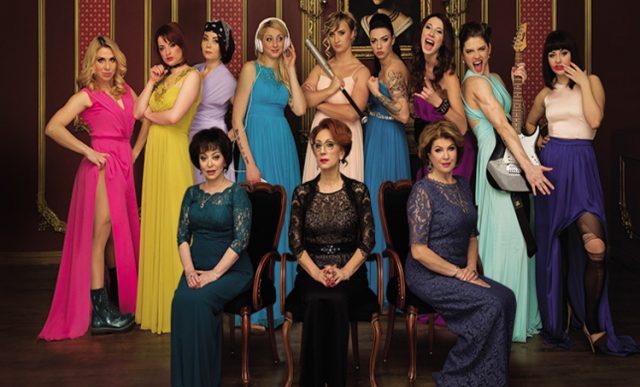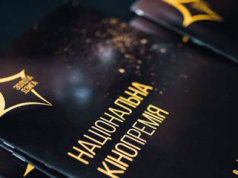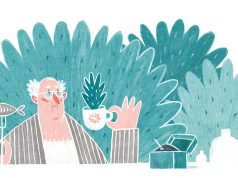A few months ago at a party in Kyiv, I met a young woman who worked at the Ukrainian television channel STB. “Oh, that’s great! I’m a big fan,” I told her. “I watch all your reality shows.” The startled woman took a step back and looked me up and down. “What’s the matter?” I inquired.
It turned out that she had long known that these shows had a target audience: middle-aged, Ukrainian homemakers and mothers of 1.54 children on average. “I just didn’t expect that average viewer to look like you,” she said. She meant: male, twenty-something, not from Ukraine, and presumably with enough common sense not to watch Ukrainian reality TV.
Like many of The Odessa Review’s readers, I value the finer things in life: great works of literature, art house cinema, innovative music, and creative cuisine. But, let’s be honest: there are times when you just want to take a rain check on the latest cerebral Czech drama, flip on the tube and enjoy some lighter fare.
Thankfully, Ukraine may be just the place to do just that. While not gifted with the financial resources of some of their neighbors, the makers of Ukrainian reality television have demonstrated a level of creativity unseen elsewhere. Their shows even remain popular in Russia, transcending even the war that has divided the two countries. In fact, there is a group on the Russian social network VKontakte called “I Watch Ukrainian Shows And Love My Life.” It has over 500 thousand subscribers.
What is the secret ingredient to Ukrainian reality television? As a particularly dedicated fan of this genre, I often find myself asking this question. So far, I haven’t discovered an exact answer. I suspect it has something to do with the genre’s unique mix of shock-and-awe scandal, pearl-clutching moralism, and village hijinks. Often, it turns the country’s reality inside out. If conventional wisdom recommends not airing one’s dirty laundry publicly, reality television empties Ukraine’s national hamper on live television.
By doing so, however, it also alters reality. Watching “Khata na tata” (“House on Dad”) or “Vahitna u 16” (“Pregnant at 16”), we know that this is not true reality; rather, it is reality played out for the camera — with all the manipulations and fabrications that entails. But that hardly matters in the end. The shows are gripping, the characters often cringeworthy, and the hijinks comical.
The following is a guide to Ukrainian reality TV shows. It is not entirely comprehensive, but attempts to identify what awaits anyone brave or curious enough to tune into any of these broadcasts. Every show listed here should be available in its entirety on YouTube (although all are in Ukrainian, Russian or a Patois combination of the two, the socalled `Surzhyk` ). To ease categorization, I have used emojis to represent different features and qualities of the shows.
🐖 = rural hijinks
🍆 = sex
💊 = pseudoscience
✈ = cultural encounters
🍔 = cuisine
😱 = gross-out revelations
🍷 = alcoholism
👪 = bad parenting
Revizor (“The Inspector”)
Channel: Novyi Kanal
Run: 2011 – Present
Themes: 🍔 😱
Fun Fact: Revizor is so successful, Russia made its own version: Revizorro.
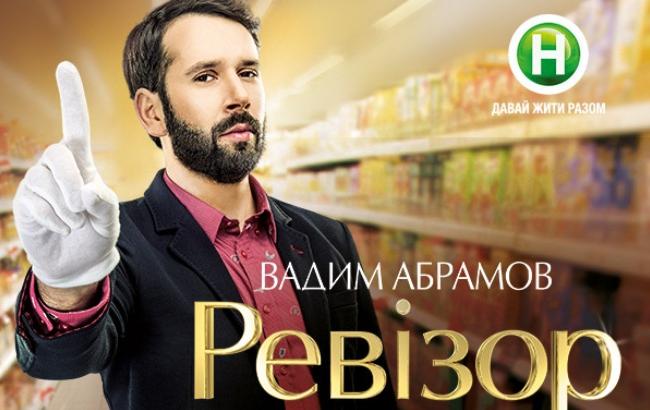
Few shows in Ukraine can claim to be as iconic as Revizor. The premise is simple. White-gloved Vadym Abramov traipses through restaurant kitchens and restrooms, hotel suites, and supermarkets across Ukraine, running his hands across the surfaces and looking for dust and petrified grease. He rifles through refrigerators to find food without expiration date stickers, discovers unsanitary cooking practices, and uncovers hairballs and toenail clippings under hotel mattresses. The fun side of the show is Abramov’s over-the-top reactions: What? This supermarket has an overripe pineapple on the shelf?! This is unacceptable! Abramov comes off as an odd twist on Jerry from Seinfeld — garishly uptight about hygiene, but less funny and more dramatic.
At the core of Revizor is a real public service. The show at times reveals truly vile things: a restaurant kitchen overrun by roaches or long-past-spoiled food in a supermarket stockroom. But often the criticism seems petty: a few stray hairs on a hotel room mattress, storing eggs in the same fridge as other ingredients (Abramov may be the only person in Ukraine who knows this is against the rules…), a mediocre bowl of soup at a cafe in Boryspil airport.
At times, it almost appears as if Abramov has never before lived in Ukraine. For example, he complains that a major supermarket chain has baked goods stocked in open baskets — a practice that is extremely widespread in Ukraine. At its worst, Revizor could at times be perceived as a full-blown assault on small business for the way its disapproving scold-in-chief tears down the reputations of local eateries.
Still, the show is fun — although it may not leave you wanting to visit your favorite restaurant any time soon.
Vahitna u 16 (“Pregnant at 16”)
Channel: STB
Run: 2012 – present
Themes: 🍆 💊 🐖 👪
Fun Fact: In reality, teen pregnancy is not a fun subject.
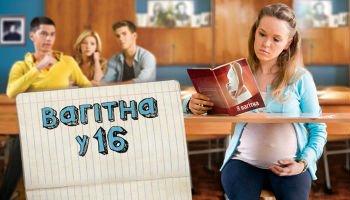
Sometimes, international cooperation takes the form of America saying, “I have a bad idea!” and Ukraine responds, “I can make it worse!” That’s the rough genesis of Vahitna u 16, the Ukrainian version of MTV’s 16 and Pregnant. MTV found a fitting partner in STB, a Ukrainian television channel particularly skilled at sniffing out human suffering and turning it into entertaining content. The premise of the show is straightforward and effective: here’s an underage girl who is pregnant, here’s her (often significantly older) deadbeat boyfriend, here are their parents — let the cameras roll! The typical scenario is dismaying in that it is believable and deeply sad. The young couple demonstrates an absurd ignorance of contraception. The young man has little interest in starting a family with his girlfriend. The young woman (and her family) have no ethical objection to abortion, but believe it leaves you sterile 100% of the time (ahem, pseudoscience). And so the young lovers find themselves slouching toward parenthood.
Much as you might yell, “Don’t go in there!” at the protagonist of horror film, you will find yourself shouting similar things at your TV screen: “Don’t take him back! He isn’t going to find a job, support you, or care for the baby! He just wants to drink canned cocktails on the street with his friends and do parkour in the ruins of the Dniprodzerzhinsk Rubber Factory! Don’t you get it?”
Of course, it’s a bit more complicated than that. As a show, Vahitna u 16 truly stretches the boundaries of reality. The participants are all real people, judging by the fact that internet users have found their social media profiles, but the onscreen action often appears to have been reenacted. Either that or STB is actively playing the role of homewrecker (and sometimes homemaker) for the sake of its audience. Either way, you’re in for an ethically questionable show.
Vid patsanky do panyanky (“Ladette to Lady”)
Сhannel: Novyi Kanal
Run: 2016 – present
Themes: 🍷, 👪 , 🐖
Fun fact: This show demonstrates better than anything else the creativity possible when you mix Ukrainian, Russian and Russian-language obscenity all in the same sentence.
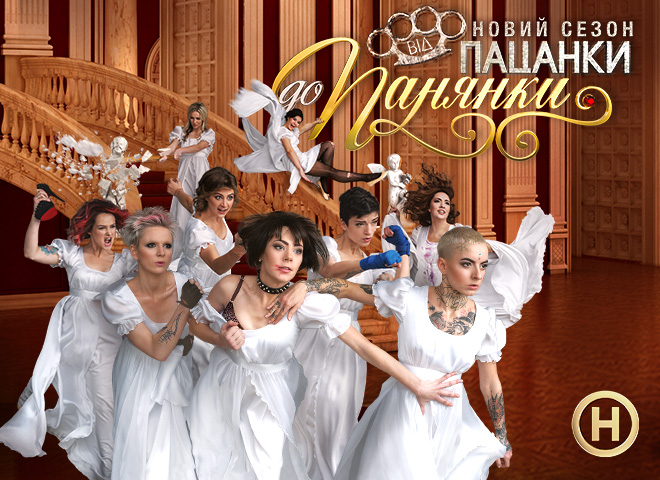
Vid patsanky do panyanky adopts the premise of the British reality show “Ladette to Lady,” but gives it a particularly Ukrainian twist. A dozen young women — usually street toughs from provincial towns — come to a mansion near Kyiv where they will be forced to live together, wear uniforms, adhere to a diet, forgo alcohol and tobacco and, ultimately, learn to be ladies.
But what does it mean to be a lady nowadays? That could easily be the lament of prudish babushka at a twerking contest. But I mean it more pragmatically: what must these young “ladettes” do? They learn manners, style and fashion (i.e. no more tracksuits) and cooking. Sounds boring, right? Well, to keep the audience entertained, the Vid patsanky includes copious footage of their conflicts and fights, scenes where they manage to get drunk, and the occasional master class on fellatio and/or sex toys. Each week one contestant is eliminated. In the end, the final three contestants are flown to the “fairytale country” (spoiler: in season one, it was Dubai) and the winner is crowned at the final ball. For her victory, she receives 100,000 UAH ($3,500), which she usually promises to spend on her further education or on her children.
Novyi Kanal presents Vid patsanky do panyanky as a multi-season public service announcement. In other words, all across Ukraine, there are supposedly tracksuit-clad, obscenity-loving young women who have gone as far as they can go in life while spitting sunflower seed shells on the ground in the courtyard of their apartment buildings. But there’s hope: they too have a shot at becoming sophisticated.
I say, stick to your tracksuits ladies.
Chotyry vesillya (“Four weddings”)
Channel: 1+1
Run: 2011 – present
Themes: 🐖 , ✈
Fun Fact: The show was reportedly inspired by the American film “Four Weddings and a Funeral,” but the producers decided to leave out the funeral.

I must be honest: I don’t entirely get this show. The premise is so straightforward and transparent as to actually become confusing. They bring together four young women from across Ukraine, each of whom is preparing to tie the knot with her beau. The group meets up and each woman outlines the plan for her wedding: the venue, the dress, the ring, the number of guests. Then the show cuts to footage of each wedding, one after another. We see the vows, the dinner, the party, Aunt Oxana dancing the solo can-can on the table, the groom washing his mother-in-law’s feet in vodka (yes, really), and so on.
Meanwhile, the other three participants sit around making fun of the the wedding. Why are they trashing their fellow contestant’s nuptials? Well, because the three rivals are supposed to assign points to each wedding. The contest whose wedding gets the most points is sent on a luxurious honeymoon. So, the incentive is clearly to denigrate.
Beyond that, however, Chotyry vesillya offers an intriguing — if not always flattering — look at social life across Ukraine.
Khata na tata (“House on Dad”)
Channel: STB
Run: 2012 – present
Themes: 🐖 , ✈, 👪 , 🍷
Fun fact: If there is a strong argument for misandry in Ukraine, this is it.
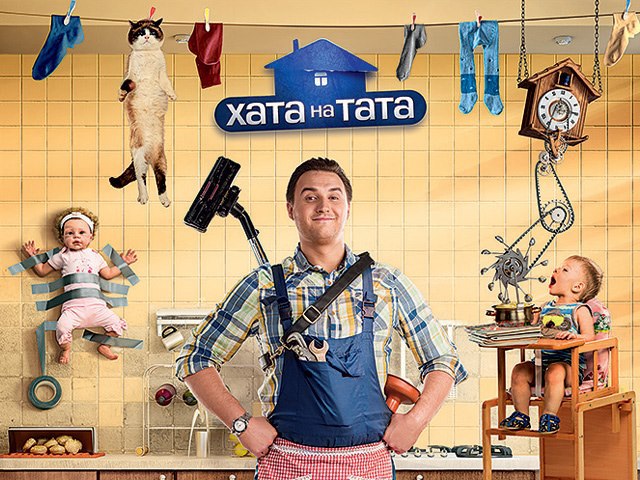
I know that it may look as if I am fairly dismissive of Ukrainian reality television, but I have nothing but positive things to say about Khata na tata. This show is brilliant, outrageous and family friendly all at once. Each episode profiles an ordinary family in Ukraine — often, in a small town. Each family has the same problem: Dad is lazy. He doesn’t help around the house, he doesn’t pay attention to his kids, he may not even hold down a job. Instead, the burden of supporting the family falls on Mom. Each morning she wakes up, cooks breakfast for her family and sends her kids to school. Then, she heads out to tend to the garden and feed the animals — often dozens of chickens, rabbits, a cow, a stye full of piglets, and one enormous pig. Sometimes, if she’s particularly unlucky, that enormous pig is her husband. Then, she must head out to work as a teacher or shopkeeper. After that, she comes home to toil away over a hot stove, do several loads of laundry, and help her kids with homework, while her husband watches television on the couch.
Then, suddenly, the producers of Khata na tata whisk Mom away to a beachside vacation and Dad is left to look after the house, tend to the farm, and take care of the kids. He also must complete a series of tasks assigned by the show, which range from painting the house to helping the family goat find a mate. Hilarity naturally ensues. Usually, Dad comes to recognize how difficult it is to be a woman in rural Ukraine and learns to be an upstanding family man. And, if he can complete all the tasks assigned by the show (and he always can) he receives a monetary prize.
It’s worth noting that several episodes of Khata na tata cross cultural boundaries. In one, the father is an immigrant from Pakistan. In another, he’s a Nigerian gynecologist. In one of the most memorable episodes, he’s a Ukrainian construction worker who is mentally stranded in the tumultuous 1990`s — with the criminal slang, shanson music and Adidas aesthetic of the period included.
Whether you’re American, British or Ukrainian, Khata na tata will take you places you have never before been.
Davai pohovorymo pro seks (“Let’s Talk About Sex”)
Channel: STB
Run: 2014 – present
Themes: 🍆 💊 😱
Fun fact: This show might actually exist only as a platform to advertise yeast infection medication.

Truth be told, Davai pohovorymo pro seks isn’t exactly a reality show. It’s a talk show. But its tendency toward cringeworthy discussion of lurid subjects places it perfectly in line with the reality TV ethos. Each episode is dedicated to a different subject related to sexual intercourse: a particular act, kink, fetish or problem. The host, Yulia Bortnyk, brings different guests into the studio and they discuss their sexual issues. In great detail. They also receive advice from a panel that includes psychologists, sex therapists, lawyers, bloggers, and the pop star Dmytro Kolyadenko.
This could be a groundbreaking, taboo-smashing show for a country like Ukraine. The problem is that, for a program aimed at crossing social red lines, its main message is pretty conservative: you should be heterosexual and in a committed monogamous relationship — and always treat a yeast infection with Pimafucin brand medication (presumably, the show’s sponsor).
That said, as a show `Davai pohovorymo pro seks` has had some good moments. For example, an episode dedicated to sex with foreigners featured a Ukrainian woman married to a Guinean man. The couple was encountering cultural issues in their intimate life. “Did you learn about Guinean attitudes toward sex before marrying your husband?” one panelist asked the woman. Her answer: “We don’t have many African people in my town. What was I supposed to do? Call the embassy and ask, ‘Hello, Ambassador, what issues with sex do you have in your country?’”
Minyayu zhinku (“I’m Swapping Wives”)
Channel: 1+1
Run: 2010 – present
Themes: ✈ , 🍔 , 👪
Fun fact: This series is a mainstay of Ukrainian television and has somehow accomplished 13 seasons in eight years.
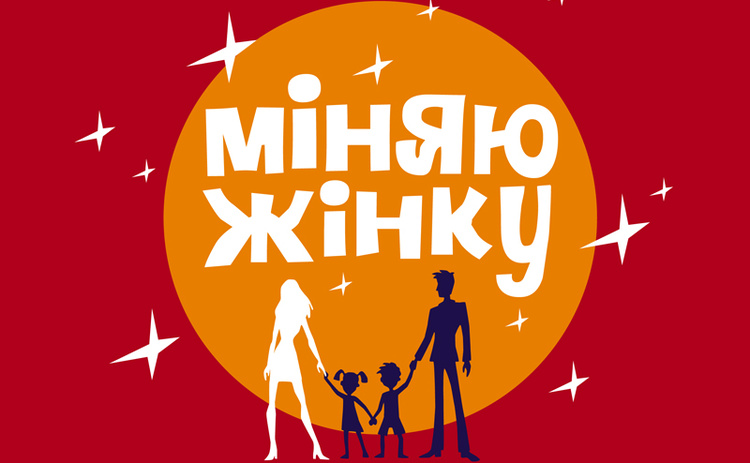
No surprise that Minyayu zhinku exists in Ukraine and that it has lasted so long on the air. This is the Ukrainian version of “Wife Swap,” a successful reality show in Great Britain, the United States, and Australia. The premise is straightforward, but fairly fertile ground for amusing antics and cross-cultural misunderstanding. Two mothers from two different families in two different cities trade places for a week. Often they are from different social classes and/or cultural backgrounds and must adjust to their unexpected new realities.
The show has become famous for an episode in which it brought a transgender woman from Canada to live with an ordinary Ukrainian family. The ensuing conflict between the show’s participants and producers — which apparently had less to do with intolerance than with cross-cultural misunderstanding — nearly turned into an international incident involving embassies and blackmail.
But the more interesting episodes of Minyayu zhinku are the less scandalous ones. In one episode a Jewish woman from Odessa and a Ukrainian from Kryvyi Rih trade places. As a gift, the Ukrainian woman presents her new Kosher-keeping “husband” with a slab of salo (pork lard). In another, a glamorous Armenian woman from a entrepreneurial family swaps places with a Ukrainian newspaper kiosk employee from the town of Chernihiv. There’s even a Ukrainian-Kenyan swap.
It’s not the most exciting of Ukraine’s reality shows, yet Minyayu zhinku marches on.




























